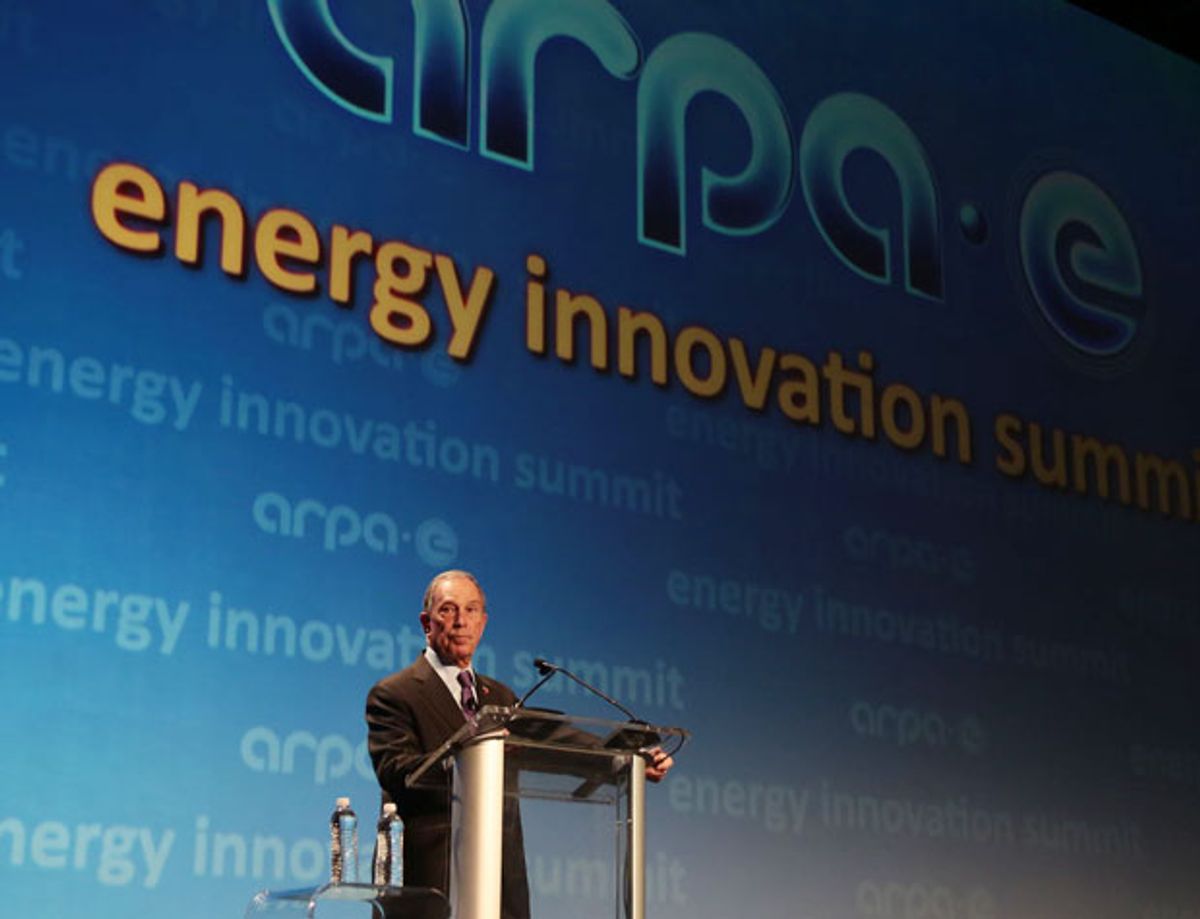The Advanced Research Projects Agency–Energy (ARPA-E) funds innovative projects on wind and solar energy, electric vehicles, biofuels, grid tech, and yes, carbon capture and natural gas technologies. But when the politicians show up here at the ARPA-E Energy Innovation Summit in Washington, D.C., it's those fossil fuels that end up dominating the conversation.
In a way, the continued prominence of coal and oil seem like background noise to the high-end technology conversations that fill the hallways at ARPA-E. But coal still accounts for around 40 percent of U.S. electricity, and in spite of increasing EV adoption oil is still powering nearly every vehicle in the country. Thus, when prominent politicians, including New York Mayor Michael Bloomberg and Senators Lamar Alexander (R–Tenn.), Lisa Murkowski (R–Alaska), and Ron Wyden (D–Ore.), speak at an energy conference, the background noise becomes the signal.
Mayor Bloomberg spent the bulk of his talk going hard at coal. "King coal is dead," he said, citing the recent closure of a coal plant just outside Washington as just one evidentiary piece of the case he was building. "It was upwind from Congress, so you would have thought they would have done something about it earlier." (Zing!) Bloomberg said the death of coal was being driven by the need to address climate change and the low price of natural gas. He acknowledged that India and China aren't quite so done with the dirtiest of fuels, but his speech was surprisingly optimistic, given some of the ongoing battles over coal export terminals on the west coast. By most accounts, coal plants are unlikely to be built in the U.S. now, but that doesn't mean we will suddenly start leaving it in the ground in Appalachia and Wyoming.
The Mayor also expressed optimism about natural gas. Actually, pretty much every politician expressed optimism about natural gas. To be sure, ARPA-E funds some interesting work on gas, especially its use as a transportation fuel; but there is no question its place in politics right now is far more central. And even someone as smart and progressive on energy as Bloomberg has his blinders on when natural gas is in the picture; until we can store renewable energy better, he said, "you will always need backup power sources." First of all, ask scientists—like, say, the DOE's National Renewable Energy Laboratory—and renewables can supply much of our energy with tech that exists right now. Second, the mayor might want to walk the Technology Showcase floor at this ARPA-E summit; it is littered with storage companies and ideas; if natural gas backup plants are needed at all, they won't be for long. Wyden, in fact, spent much of his speech zeroing in on storage, and just how transformative advances in the area will likely be in the near future.
Unsurprisingly, Senators Alexander and Murkowski are also quite bullish on the natural gas boom. Alexander began with a story about going quail hunting in Texas and instead of birds finding endless fields of natural gas and oil rigs. This, I think, was meant as a positive, as was his proud claim that in the U.S. we pay one-fifth to one-sixth for natural gas of European and Asian prices. This seems like a good time to note that Mayor Bloomberg mentioned the need for a carbon tax, while the Senators did not.
Sen. Murkowski also hyped an achievement that I'm guessing many in the room weren't so high on, that U.S. crude oil production increased more last year than it has since 1859. Murkowski touched on her Energy 2020 plan, and seemed most concerned with setting details of it off from President Obama's ideas. Primary difference: She wants to fund energy research by expanding oil and gas drilling into as-of-yet untouched areas, while the President at least wants to keep it to areas already leased for such activities.
The politicians agreed, at least, on ARPA-E's importance—not exactly surprising, given that they were the ones who showed up at the Summit to speak. Just how important it is, though, seems up for some debate. Alexander made a point of emphasizing that programs like ARPA-E are somehow not at risk from the impending "sequester," but instead from "automatic spending increases" in other areas. "I’m for doubling the amount of money we spend on energy research in America," Alexander said. Good. We should get that money, though, by cutting energy subsidies; given his insistent demand to specifically end wind power subsidies, I'm guessing the ARPA-E room would agree with me: Bad.
So, coal is dead, gas is king, oil is humming along just fine thanks. When politicians take center stage in discussions of innovation in energy, it's the old, dead-dinosaur types of energy they bring into the spotlight.
Photo: Edward Reed
Dave Levitan is the science writer for FactCheck.org, where he investigates the false and misleading claims about science that U.S. politicians occasionally make.



